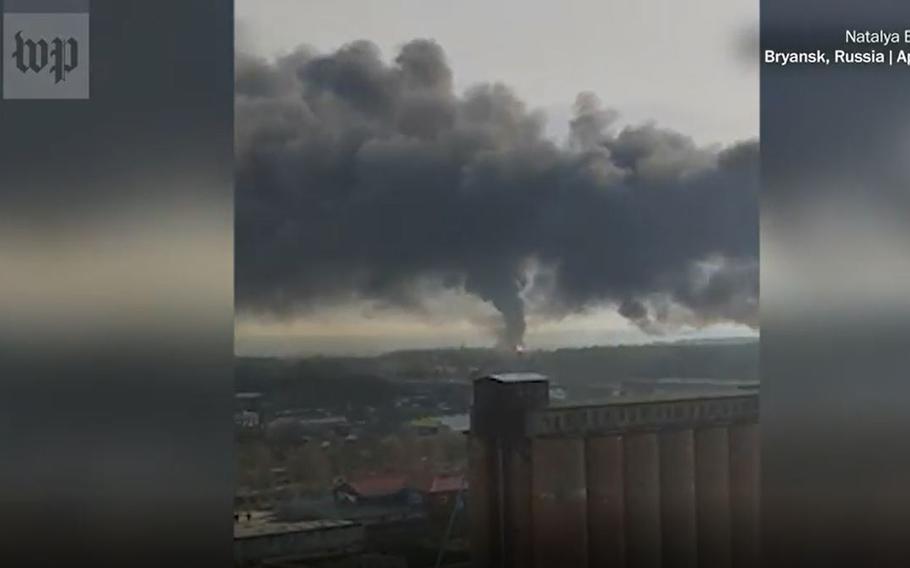Europe
Mystery fires at sensitive facilities compound Russia’s war challenge
The Washington Post April 28, 2022

This screenshot shows large plumes of smoke seen on April 25 after fire broke out at an oil storage in Bryansk, a Russian city less than 100 miles from the border with Ukraine. (Natalya Bokova/The Washington Post)
A series of unexplained fires and explosions at strategic locations in Russia, including storage depots, a sensitive defense research site and the country’s largest chemical plant, have raised suspicions that at least some may have been caused by sabotage or Ukrainian attacks.
In the latest incidents on Wednesday, Russian media reported explosions at three storage depots in the Belgorod, Voronezh and Kurzk regions near Ukraine’s eastern border, an area used to supply and reinforce troops engaged in Russia’s battle for control of the Donbas region.
No casualties were reported in the blasts, the reports said. Belgorod’s regional governor, Vyacheslav Gladkov, was quoted as saying authorities had extinguished a fire at an ammunition depot after an explosion. He did not specify its cause.
Russia’s state-owned news agency Tass said that “two loud bangs” were also heard overnight in Voronezh, some 200 miles from Ukraine. Russia Today, another state-owned media outlet, quoted regional Gov. Roman Staravoit as saying that a Ukrainian drone was shot down over Kursk, just over 70 miles from Ukraine.
Wednesday’s explosions followed two blasts on Monday at oil storage depots in the city of Bryansk, also near the Ukrainian border. Footage shared on social media of one of those blasts suggested it was caused by “an air or missile strike,” according to a tweet by Rob Lee, a senior fellow at the Foreign Policy Research Institute. The depots are less than 100 miles from Ukraine, within range of that country’s Tochka tactical ballistic missiles, Lee noted.
All of the sites hit are likely involved in supplying fuel and ammunition to the troops engaged in Donbas and the damage may hinder Russia’s efforts to sustain its offensive there, Lee said.
Russia has not said what caused these latest fires, but earlier this month the Kremlin accused Ukraine of carrying out a helicopter attack against a fuel depot in Belgorod.
Ukrainian officials have declined to comment on whether Ukraine was involved, but they have not discouraged suggestions that it might have been.
An adviser to Ukrainian President Volodymyr Zelensky suggested “karma” may have been responsible and said a country such as Russia that invaded another country and killed its citizens should expect to have its facilities attacked.
“Sooner or later the debts will have to be repaid,” Mykhailo Podolyak said in a Telegram post written in Russian. “And therefore the disarmament of the murderers’ Belgorod-Voronezh warehouses is an absolutely matter-of-course, natural process. Karma is a cruel thing.”
If Ukraine is behind the attacks on Russian soil, it would represent a major escalation in the war. It also would be a significant embarrassment for Russia, spotlighting how the country it invaded two months ago with the expectation of a swift victory has managed to strike back deep inside its own territory.
At least two other fires well out of the range of Ukrainian missiles and drones can’t easily be explained.
Last Thursday, a blaze tore through the upper stories of the Defense Ministry’s Second Central Research Institute in the town of Tver, northwest of Moscow; at least 17 people died, according to Russia’s state-run Tass news agency. More than two dozen people were injured, the news agency said, including some who jumped for their lives out of the building’s upper floors.
The institute is known as a center for highly sensitive research on key missile systems, including Russia’s most advanced stealth programs as well as the Iskander missile, extensively used in Ukraine, and the S-400 air defense system.
Tass said initial inquiries suggested the fire was caused by an electrical fault but that a criminal investigation had been launched.
Hours later, Russia’s biggest chemical plant burned down, also for unknown reasons. The Dmitrievsky Chemical Plant, located about 208 miles northeast of Moscow in Kineshma, was a major supplier of propellants essential for the production of the precision-guided missiles Russia needs for the war.
A third fire then engulfed a sensitive facility at the College of Aerospace Engineering and Technology in the Moscow suburb of Korolyov, which is renowned as the home of the Soviet Union’s and Russia’s space programs.
The fact that so many fires have broken out at key locations in such a short period is “quite suspicious,” said Dmitri Alperovitch, chairman of the Silverado Policy Accelerator think tank in Washington. However, he added, it is “really impossible to tell at this stage.”
There are explanations other than sabotage, Alperovitch said. Accidental fires are not unusual in Russia, which has a reputation for poor maintenance, and Western sanctions are making it harder to secure spare parts for vital machinery.
Oleksiy Arestovych, a military adviser to Zelensky, said he doubted Ukraine was involved in the fires at the defense-related facilities and suggested that Russian officials are setting fires to cover up evidence of corruption.
“I think you need to look for reasons inside Russia — for example, hiding the means by which money has been stolen from the Russian defense ministry,” he said.
- - -
The Washington Post’s David Stern in Ukraine contributed to this report.